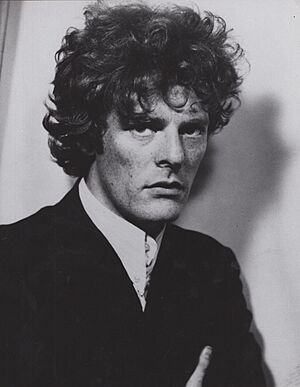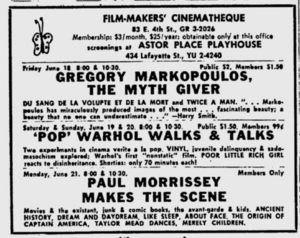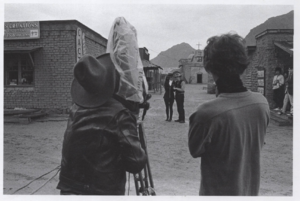Paul Morrissey facts for kids
Quick facts for kids
Paul Morrissey
|
|
|---|---|

Morrissey in 1967
|
|
| Born |
Paul Joseph Morrissey
February 23, 1938 New York City, U.S.
|
| Died | October 28, 2024 (aged 86) New York City, U.S.
|
| Alma mater | Fordham University |
| Occupation | Filmmaker |
| Years active | 1961–2010 |
| Known for | Warhol superstar |
Paul Joseph Morrissey (February 23, 1938 – October 28, 2024) was an American film director. He was well-known for working closely with the famous artist Andy Warhol.
Morrissey directed many popular films. Some of his most famous movies include Flesh (1968), Trash (1970), and Heat (1972). These films often starred Joe Dallesandro. He also directed Flesh for Frankenstein (1973) and Blood for Dracula (1974). Later, he made a group of three films about New York City in the 1980s: Forty Deuce (1982), Mixed Blood (1985), and Spike of Bensonhurst (1988).
From 1965 to 1973, Paul Morrissey managed the publicity and filmmaking for Andy Warhol at a place called The Factory in New York City. He also helped manage the music band Velvet Underground and Nico from 1966 to 1967. He even helped create and name Warhol's traveling art show, the Exploding Plastic Inevitable. In 1969, Morrissey, Warhol, and publisher John Wilcock started a magazine called Interview.
In 1971, Warhol and Morrissey bought a large oceanfront property in Montauk, New York. Morrissey later sold this property in 2006. In 1998, he received the Jack Smith Lifetime Achievement Award at the Chicago Underground Film Festival for his work in film.
Contents
Early Life and Start in Film
Paul Joseph Morrissey was born in Manhattan, New York, on February 23, 1938. His parents, Joseph and Eleanor Morrissey, were Irish Catholic. He grew up in Yonkers, New York, as the second youngest of five children. He went to Fordham Prep and Fordham University, both Catholic schools.
After college, he joined the United States Army and became a First Lieutenant. While still in the Army reserves, he moved to the East Village in New York City in 1960. There, he opened a small movie theater called the Exit Gallery. He showed many different kinds of films, including early works by director Brian De Palma. At the same time, Morrissey started making his own short, silent 16mm comedy films. These included Mary Martin Does It (1962) and Like Sleep (1964).
Working with Andy Warhol
In June 1965, Paul Morrissey met Andy Warhol. This happened at the Astor Place Playhouse, where Morrissey was showing some of his films. Poet and filmmaker Gerard Malanga introduced them. Andy Warhol was impressed by Morrissey's skills in filmmaking. He invited Morrissey to his studio, The Factory, to help with his next film, Space. This film was made in July 1965 and featured people like Edie Sedgwick. After this, they worked together on many more films.
Morrissey met actor Joe Dallesandro while filming a scene for Andy Warhol's long movie Four Stars. Dallesandro happened to have friends in the same building. Morrissey quickly cast him in a scene that appeared in Loves of Ondine (1967). This was Dallesandro's first time in a Factory film.
After an incident involving Andy Warhol in June 1968, Morrissey directed his first movie on his own, called Flesh. Andy Warhol produced the film for $4,000. It starred Joe Dallesandro and became a huge success in West Germany, selling over 3 million tickets.
The success of Flesh continued into the 1970s. Morrissey directed two more popular films produced by Warhol, both starring Dallesandro: Trash and Heat. Heat was a funny movie about Hollywood.
In 1971, Morrissey also directed Women in Revolt. This film was a playful look at the Women's liberation movement and starred famous people from Warhol's Factory like Jackie Curtis and Candy Darling. A picture of Candy Darling from this movie even appeared on the cover of a song by the band The Smiths.
Morrissey once said about filmmaking: "To me, moviemaking is dealing with personalities, people who are always the way they are in every film, like John Wayne or Clint Eastwood... It doesn't really matter what the camera's doing as long as the people are worth watching."
After The Factory Years
In March 1973, Paul Morrissey traveled to Rome, Italy. There, he directed two films back-to-back: Flesh for Frankenstein (1973) and Blood for Dracula (1974). Both films starred Joe Dallesandro and Udo Kier. These movies were very successful around the world.
After this success, Morrissey tried directing a big studio film called The Hound of the Baskervilles (1978). He co-wrote the film, but it was not very popular with audiences or critics. In the late 1970s, Morrissey moved to Los Angeles. He then went back to making independent films, starting with Madame Wang's (1981), a funny movie about the punk-rock music scene in Los Angeles.
In the early 1980s, Morrissey returned to New York City. He began working with writer Alan Bowne. He directed a film version of Bowne's play Forty Deuce (1982), which starred Kevin Bacon. Morrissey and Bowne also worked together on the screenplays for Mixed Blood (1985) and Spike of Bensonhurst (1988). These three films together formed a series that looked at the changes in New York City during the 1980s.
Morrissey's last feature film was News From Nowhere (2010). It was shown in the U.S. in the fall of 2010.
Paul Morrissey passed away from pneumonia in a hospital in Manhattan on October 28, 2024. He was 86 years old.
Filmography
- Ancient History (short) 1961
- Dream and Day Dream (short) 1961
- Mary Martin Does It (short) 1962
- Civilization and Its Discontents (short) 1962
- Taylor Mead Dances (short) (1963)
- Peaches and Cream (short) (1964)
- Merely Children (short) (1964)
- About Face (short) (1964)
- The Origin of Captain America (short) (1964)
- Like Sleep (short) (1964)
- All Aboard the Dreamland Choo-Choo (short) (1965)
- Paul Swan (1965)
- More Milk, Yvette (1966)
- Hedy (1966)
- Chelsea Girls (1966)
- The Velvet Underground and Nico: A Symphony of Sound (1966)
- Imitation of Christ (1967)
- Tub Girls (1967)
- I, a Man (1967)
- Bike Boy (1967)
- Loves of Ondine (1967)
- The ... Restaurant (1967)
- Four Stars
- San Diego Surf (1968)
- Flesh (1968)
- Lonesome Cowboys (1968)
- Trash (1970)
- I Miss Sonia Henie (short) (1971)
- Women in Revolt (1971)
- Heat (1972)
- L'Amour (1973)
- Flesh for Frankenstein (1973)
- Blood for Dracula (1974)
- The Hound of the Baskervilles (1978)
- Madame Wang's (1981)
- Forty Deuce (1982)
- Mixed Blood (1985)
- Beethoven's Nephew (1985)
- Spike of Bensonhurst (1988)
- Changing Fashions (short) (1993)
- Veruschka: A Life for the Camera (documentary) (2005)
- News from Nowhere (2010)
See also
 In Spanish: Paul Morrissey para niños
In Spanish: Paul Morrissey para niños
 | Lonnie Johnson |
 | Granville Woods |
 | Lewis Howard Latimer |
 | James West |



